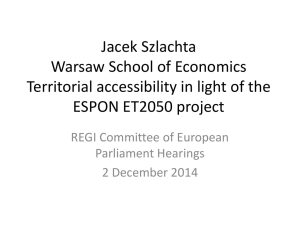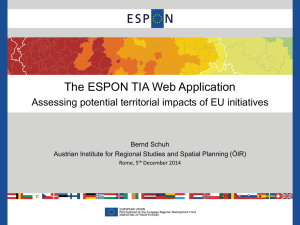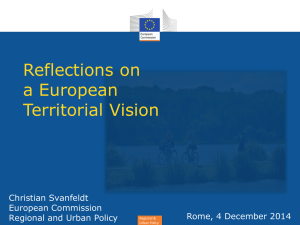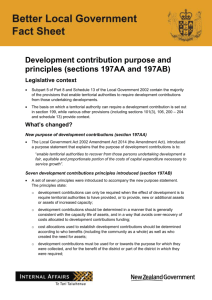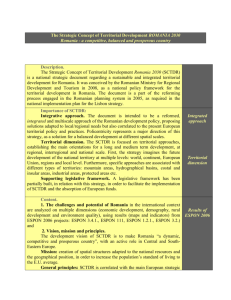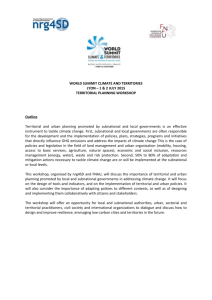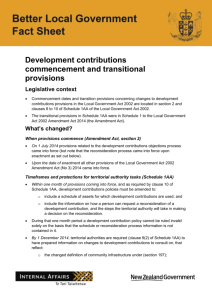Daniel Rauhut
advertisement
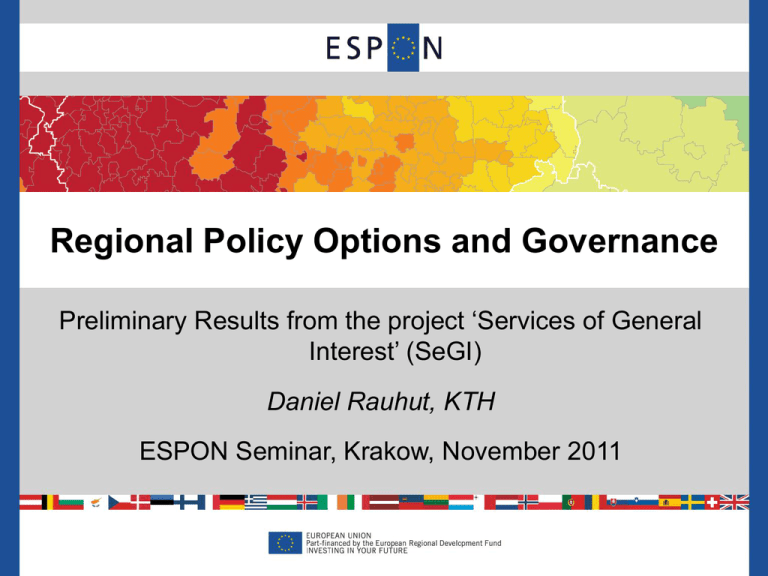
Regional Policy Options and Governance Preliminary Results from the project ‘Services of General Interest’ (SeGI) Daniel Rauhut, KTH ESPON Seminar, Krakow, November 2011 The TPG - The Royal Institute of Technology (KTH), Sweden – Lead Partner - University of Vienna (UNIVIE), Austria - Federal Institute for Research on Building, Urban Affairs and Spatial Development (BBSR), Germany - Centre of Geographical Studies (CEG), University of Lisbon, Portugal - University of Akureyri (UNAK), Iceland - Norwegian Institute for Urban and Regional Research (NIBR), Norway - Institute of Geography and Spatial Organization (IGSO), Polish Academy of Science, Poland - PlanIdea, Hungary - Academy of Economic Studies in Bucharest, Research Centre for Macroeconomic and Regional Forecasting (PROMAR), Romania - Territorial Observatory of Navarra (NASURSA), Spain - University of West of England (UWE) United Kingdom 2 The aim of the project The prime objective of the project is to address the identified need for support for policy formulation, at all levels of governance and respect of all types of territories, for the effective delivery of services of general interest throughout Europe. The project will identify the gaps that exist in the territorial evidence to support implementation, monitoring and evaluation of territorial policy measures for services of general interest. 3 Policy questions 1 How should the defined (groupings of) services of general interest be addressed by territorial development and cohesion policies? 2 What is the territorial distribution of the services of general interest throughout the European territory and how can this be measured? 3 How and to what extent do the various levels of services of general interest contribute to the global competitiveness, economic development and job growth of cities, urban agglomerations and other territories? 4 Setting the scene • Defining the key concepts What is SGI? What is Territorial Cohesion? What are the policy ambitions? • Implementation and monitoring Responsibility for SGI? How are policies implemented? How is implementation monitored? • Results • Solutions 5 Telecommunications Sweden Germany The market is fully liberalised and EU policies are applied. Regional The market is fully liberalised and EU policies are applied. National targets are additionally developed. (-) Local/Municipality (-) (-) National (-) In the telecom sector both countries have fully liberalised markets and have adopted the general EU policies. Important to remember is the territorial differences and Sweden that is a large country in many areas is sparsely populated and has focused many of its policies on territorial distribution. 6 Education The education sector shows a very heterogeneous reality with many actors, public and private at different levels. The two countries have very different division of responsibility on organisation, financing and monitoring. National Sweden Germany National guidelines and (-) targets are strongly influenced by EU targets and the Europe 2020 strategy but are taken as national policies. Tertiary education is normally state-run. Regional (-) All education, policy-making, operation and monitoring is a regional responsibility through the federal Länder. Local/Municipality Primary and secondary education is a municipality responsibility. Most schools are public but private schools with special profiles are allowed as long as they follow the national objectives. 7 (-) Waste management Both countries have adapted many of the EU policies on waste management but the operating responsibility is on local levels involving many private actors, making the way from EU policy to implementation long and complicated. National Sweden Germany National guidelines and The Federal Environment targets are decided by the Ministry is responsible for parliaments. In practice waste policies and the political they are strongly key words are more or less influenced by the EU the same as the EU main policies but some national objectives. objectives are added. Regional (-) (-) Local/Municipality The municipalities alone or (-) in cooperation with other municipalities are responsible for the waste management, producers and other waste generators are responsible for their own waste. Waste collection and treatment facilities are commonly operated by private actors. 8 Preliminary conclusions Four clear conclusions can be drawn: 1. The EU formulates policies that are difficult to implement; the Member States produces their own policies and implements them instead. 2. The open method of coordination (OMC) is the model used for policy implementation in the EU. Evidence shows that this model is better suited for information exchange; the implementer has no monitoring possibilities with the OMC. 3. In many Member States many policies on SGI are formulated on the national level and implemented by either national or local agents, both public and private; the regional level is not so marked. 4. If the policy goals of Europe 2020 are going to be implemented a revision of the present methods for implementation and monitoring need to be considered; this is highly politicaly controversial. 9 Merci beaucoup pour votre attention! Daniel Rauhut The Royal Institute of Technology (KTH) daniel.rauhut@abe.kth.se http://www.espon.eu/ 10
